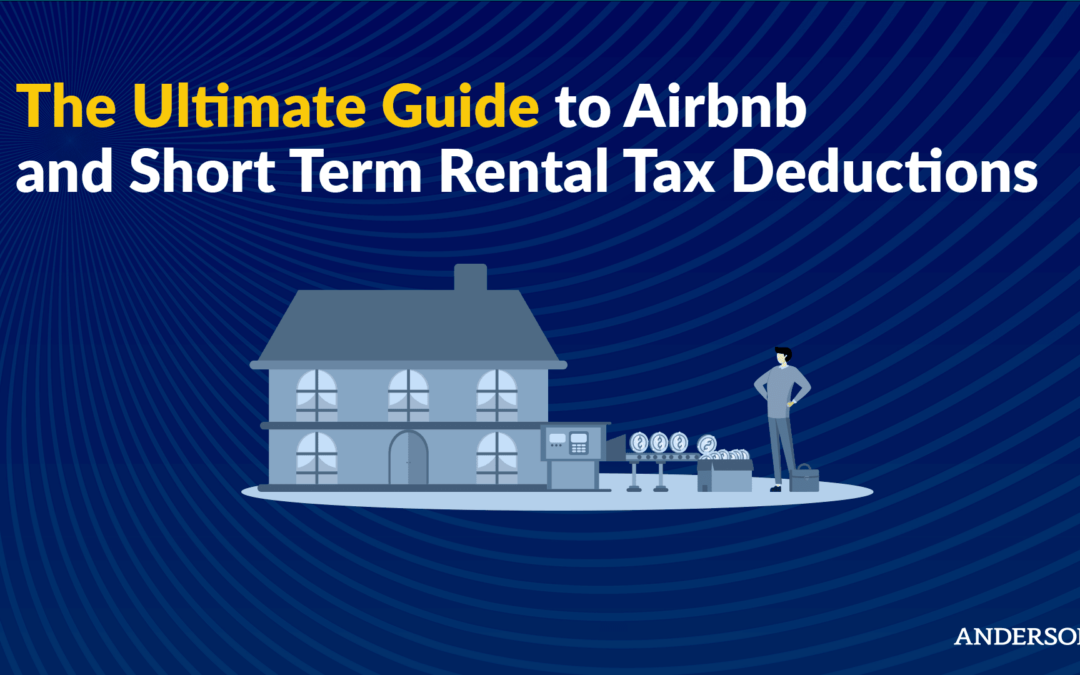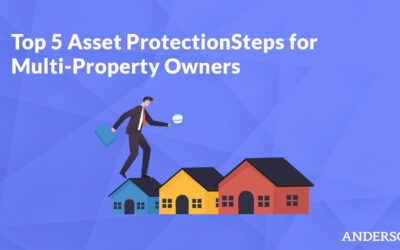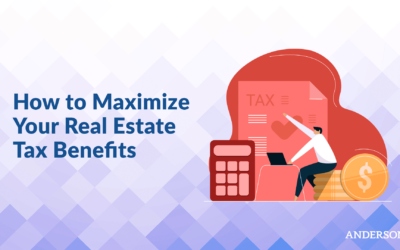
This page was updated to reflect current information – March 14th, 2023
Airbnb is an app for turning your vacant property or properties into vacation destinations. And if you own an Airbnb property, there are several tax breaks you could be taking advantage of.
Key Takeaways: Guide to Airbnb and Short Term Rental Tax Deductions
- The travel sector has been disrupted by Airbnb, which also offers rental property owners a successful business model.
- Depreciation, cost segregation, furnishings, cleaning/maintenance fees, marketing, home office deduction, commissions and fees, mortgage interest and insurance, and other indirect expenses are just a few of the tax deductions that Airbnb hosts may be eligible for.
- Using the Modified Accelerated Cost Recovery Method, depreciation enables property owners to write off the value of their assets over time (MACRS).
- By depreciating property improvements separately from the actual property, cost segregation studies assist property owners in lowering their tax liability.
- Property owners are able to write off company charges for things like office supplies, cleaning and maintenance fees, marketing costs, and home office costs.
- Tax deductions are available for Airbnb commissions and fees, as well as for most situations, mortgage interest, insurance premiums, and property taxes.
- Additional indirect costs, like rent, travel costs, utilities, and software subscriptions for property management, may also be deducted.
- To maximize deductions and guarantee compliance with regional tax laws, get advice from a tax professional.
How Did Airbnb Get Its Start?
In October of 2007 roommates Brian Chesky and Joe Gebbia came up with the cheeky idea to throw an air mattress in their living room and rent it out as a bed and breakfast. Though it would seem to be the type of joke originating from a late-night conversation, it was actually a pragmatic response to the lack of hotel accommodations in the city. The duo booked their first customers during the 2008 Industrial Design Conference, at which point they named their business website AirBedAndBreakfast.com (likely referencing the air mattress) and were joined by Nathan Blecharczyk.
The idea seemed to be building steam, because at the beginning of 2009 computer programmer Paul Graham of startup incubator Y Combinator invited the trio to New York. They returned home with a modest venture funding and a marketable business model.
Tax Attorneys, CPAs & EAs who specialize in working with businesses and investors. Speak with an Anderson Professional Advisor to get your FREE Tax Plan Strategy Session. Limited-Time offer: FREE (a $750 value.) business tax experts today to determine whether it’s possible to rent your personal residence to your business in an effort to lower your tax burden!
By March of that year, they had 2,500 properties on their platform and 10,000 users. Over the next few years, Airbnb (as it then became called) began receiving millions of dollars in seed money and opened offices around the world in London, Paris, Milan, Moscow, Barcelona, and Sidney. Fast forward to 2021, and Airbnb has 5.6 million listings around the world in 100,000 different locations.
Airbnb did suffer a profitability setback during the Covid-19 pandemic and laid off a significant number of employees, but they also raised millions of dollars to compensate hosts whose guests had cancelled their plans. In 2020, Airbnb went public with an IPO, and at the time of this article traded at $171 per share, up $102 over the course of the year.
As you can see, Airbnb presents a business model that is here to stay, made possible by smartphone and app technology that can pair hosts and travelers around the world, matching them up based on interest and availability.
There’s no doubt about it: Airbnb has disrupted the travel industry—creating a whole new way to make money with real estate. If you’re an Airbnb host looking to make extra money through short term rentals, you’re going to want to pay extra attention to these tax write offs:
Un-Tax Yourself Ebook
With this FREE ebook by Real Estate and Asset Protection expert Clint Coons, esq. you’ll learn exactly how seasoned real estate investors use simple tax write-offs to build massive wealth over time.
9 Airbnb Tax Deductions to Write Off
1. Depreciation
The IRS has four simple requirements to determine if you’re eligible to take advantage of depreciation as a tax deduction: (1) you own the property, (2) you use the property to generate income, such as renting it out as an Airbnb, (3) improvement to the property (like the actual house you are renting) has a useful and determinable life that can experience a value reduction based on natural wear and tear, (4) the property improvement will last for more than one year, thus excluding temporary dwellings.
Depreciation can begin as soon as the property is rental ready, and you can continue to write off depreciation until you have written off the entire value of the property or when you retire it from servicing by taking it off the rental market, selling it, or disposing of it. You can also claim depreciation while the property sits idle, but it must be sitting idle with the intention to rent it out again.
Depreciation is calculated by using the Modified Accelerated Cost Recovery System (MACRS), which spreads out the depreciation over 27.5 years. First, you must calculate your basis in the property, which is how much it cost you (including certain settlement fees and closing costs). Then, you must figure out what percentage of the property’s value is from the land, and what is from improvements to the land. You can often figure this out from the most recent real estate tax assessment, which will break down the then-assessed value into house and land. Apply the percentage representing the building to your property basis, and you’ve got the amount you can write off for depreciation. Once you have the depreciation number, you may have to adjust it based on improvements to the property—such as a patio, pool, or other renovations.
There are also two different type of MACRS methods: the General Depreciation System is used for most properties and spreads out the depreciation over 27.5 years, while the Alternative Depreciation System applies to rentals that you are only renting out 50 percent of the time (perhaps, for example, a property or vacation property you use yourself), has a tax-exempt use, or is used for farming. You’ll need to speak to your accountant and determine if the ADS applies to your Airbnb.
Also keep in mind that if your property is commercial (such as putting a motel on Airbnb), anything with more than four units is no longer considered residential property, and your depreciation will be stretched over 39 years instead of 27.5.
Schedule a free consultation with an Anderson Business Advisors today to discuss real estate depreciation strategies as they relate to your short term rental investments.
2. Cost Segregation
What if you’ve made improvements to your Airbnb that depreciate faster than 27.5 years? In that case, you may want to consider investing in a cost segregation study. These studies usually take one to two months to complete, and they help an accountant break down the property into different categories.
Personal property will be depreciated over a five to seven years, while land improvements will be depreciated over a 15-year period.
Did you pay $40,000 to build a pool in the backyard? Did you drop $5,000 for state-of-the-art appliances for the kitchen? If you’ve made any kinds of improvements like these, a cost segregation analysis can help you reduce your tax burden in a more concentrated manner by allowing you to write off the depreciation of personal property and landed improvements separate from the property itself.
3. Furniture
While it’s true that you can put your property up on Airbnb as is, if you transform the interior, you’re probably going to get a lot more interest from potential renters.
Think about the way you would shop for a place to stay while traveling: the accommodations that catch your eye are the ones you’re more likely to book. Which is why many Airbnb owners find themselves buying furniture and decorations to spruce up the look of their property. This is a business expense, and one you can write off at that. Couches, chairs, tables, and even artwork and accent pieces can all go into the tax deduction bag. Just make sure you keep the receipts and invoices for accounting purposes.
Schedule a consultation with one of Anderson Advisor’s business tax experts today to determine whether it’s possible to rent your personal residence to your business in an effort to lower your tax burden!
4. Cleaning/Maintenance Fees
Another expense that Airbnb owners need to take into account is cleaning and maintenance. Having a weekly cleanup crew come by could cost as much as a few hundred dollars every week. And, of course, the usual home maintenance could cost hundreds (if not thousands) of dollars over the course of the year. These cleaning and maintenance fees should be deducted as business expenses as well.
5. Marketing
Your Airbnb could be on its own private island with an infinity pool overlooking the ocean, but if travelers don’t know it exists, it’s likely to get buried under all the other listings available in the area. Like any business, you can’t just build it and hope they come—you’ve got to market your property.
Marketing expenses add up quick! Everything from hiring graphic designers to create ads to paying social media advertising fees is all eligible for tax deductions are tax deductible, and should be tracked throughout the course of the year.
6. Home Office Deduction
This tax deduction is one that you might overlook, especially since it’s not specifically tied to the property you’re renting. But if you do any kind of property management or booking from home, it’s one tax deduction you can certainly take advantage of.
Are you opening a laptop to check on bookings, edit your listing, and troubleshoot issues? Are you sitting at the kitchen table to call landscaping companies for an estimate to spruce up the front yard? If you’re doing all this work at home, the standard home office deduction allows you to deduct up to 300 square feet of space as a home office for $5 per square foot (with a maximum tax deduction of $1,500 annually).
If you’re feeling a little uncomfortable taking that much off your taxes, take note that the average dining room in America—a space with the flat surface of a table such as you might use to work in the evenings—is 224 square feet.
But wait, it gets better. If you’re using your home office to store more than a laptop, you can write off even more.
Let’s say you store extra Airbnb materials in your home office—this could include bedding, lawn care equipment, toiletries, or even welcome gift baskets. Your home office space then qualifies to use the area method or number of rooms method to write of this business-related space.
The area method involves taking the square footage of the space you use for business and dividing it by the total square footage of your home to get a percentage you can multiply against your own personal housing costs, like rent or mortgage.
The number of rooms method allows you to take the number of rooms dedicated to your business and divide it by the total number of rooms in your home, multiplying that percentage against your housing costs.
While it’s true that you could store some of these necessary items at the location of the Airbnb itself, you may decide the write off is worth giving up the extra bedroom.
7. Commissions and Fees
The commissions and fees that Airbnb withholds from bookings are also tax deductible. Airbnb will take roughly 20 percent of listings earnings to pay for its backend support. You may be wondering how vacation rental owners can treat these fees and commissions as a deductible expense; it’s because your taxable income is not going to include the price that someone pays to enjoy your vacation rental. You’re just going to report the rental income that Airbnb pays you, which will already have the fees taken out.
This is a rental expense that you have to pay for the privilege of listing your rental property on Airbnb. For tax purposes, you can treat these commissions and fees as an itemized deduction. It should also be mentioned that Airbnb charges lodging tax and occupancy tax in most jurisdictions, so if you’re the property owner of a rental business in one of these jurisdictions, you do not need to collect and pay these taxes. However, this is not true for every jurisdiction, so the best tax advice we can offer in this area is to consult with a tax professional who is familiar with tax liability obligations at the state and local levels.
8. Mortgage Interest, Insurance, and Taxes
If you are paying a mortgage on the Airbnb property, you can deduct mortgage interest from your taxes, just as you would with your own personal property. But wait, there’s more: if you have private mortgage insurance on your Airbnb property you can write that off as well (in most cases). This might be either because you initially purchased it with an FHA loan or because your down payment was less than 20 percent of the purchase price.
A quick side note: if you purchased your Airbnb with an FHA loan, it needs to be your primary residence for at least one year (you may have already checked that box). That means you could rent out a room if you so choose, or rent it out part time, but the home needs to be your primary residence.
You might also be surprised to learn that you can deduct property insurance for your Airbnb rental, since you typically can’t write off homeowner’s insurance on your personal tax return. That’s because, in this case, your property is not your personal residence, but an Airbnb business that you’re renting out, so the insurance is considered a business expense.
Lastly, you should check with an accountant to see if you can write off your property tax as a short term rental host. If you pay your property taxes early, later on in the tax season you may be able to write that amount off on your personal income tax return.
9. Other Indirect Expenses
When you are actively involved in using an investment property to generate income, there may be other indirect expenses that haven’t been listed here. Some of these Airbnb expenses, such as marketing and property insurance, have been discussed, but what if you are paying a property manager to deal with the daily ins and outs of your vacation rental? What if you have travel expenses to check in on the properties? What if you have utilities and subscriptions to property management software to facilitate management, accounting, and booking?
All of these overhead costs can be listed as indirect expenses and deducted. Some of these might be covered by a Qualified Business Income Deduction (QBI deduction), which allows you to deduct up to 20 percent of your business income, while others (such as solar power) might provide additional tax breaks.
Bonus Video
How to Qualify for Short Term Rental Tax Deductions
If you want to claim tax deductions on your short term rental property, you need to meet the following requirements:
- 14 Day Rule
- Material Participation Activity
The 14 Day Rule (also called the Masters Rule, in reference to the Masters PGA Tournament), is where homeowners will rent out their home to travelers wanting to take part in an event.
The rule basically says that if you don’t rent out the home for more than 14 days annually, AND if you use the vacation home yourself for at least 14 days annually (or if you use it at least 10 percent of the total number of days you rent it out to others), you can avoid paying income tax on your short term rentals.
The 14 Day Rule also applies even if you are only renting out one room in your house. Unless your Airbnb venture is nothing other than occasional dabbling to pick up a few hundred dollars over the course of the year, this rule probably won’t be applicable to you.
If you do want to rent your home out for more than 14 days over the course of the year, and you want to enjoy some of the tax breaks listed above, you need to meet the IRS standards for Material Participation Activity. When it comes to renting out an Airbnb, it’s likely you won’t have to worry too much about the IRS standards because you own the property. Even if you’re not getting 50 percent of your income from the property or dedicating more than 750 hours to your Airbnb annually, if you own more than 10 percent of the property and you are actively involved in its property management, it’s considered active income and you can write off losses and expenses.
It is important to make sure that your Airbnb income is considered active income for the purposes of tax reporting, because passive income cannot be subject to many of the tax deductions listed above. One of the easiest ways to make sure that you’re compliant for Material Participation is to make sure your business activity is constant and consistent. In most cases this will allow you to write off up to $25,000 per property, and can include many of the tax deductions listed above.
Airbnb Tax Breaks Maximize Profits
Airbnb is a great way to turn a vacation property into a source of income. Of course, as mentioned, there must be some active involvement on your part for it to qualify as the type of income that can be subject to tax deductions. But if you meet the requirements, there are a number of business-related expenses you can deduct from the profits of operating an Airbnb.
If you are an Airbnb owner interested in learning more about short term rental tax deductions, download our ebook, Un-Tax Yourself: Real Estate Investors Guide to Harvesting Short-Term Rental Tax Deductions, by Clint Coons. There are many wonderful tax breaks your vacation rental could qualify for, and we’re more than happy to help you take full advantage of them!
Free Strategy Session with an Anderson Advisor
Receive a detailed risk assessment to assist in lowering problem areas that could wipe out all of your assets with one wrong move. Speak with an Anderson Professional Advisor to get your FREE Strategy Session. Limited-Time offer: FREE (a $750 value.)













